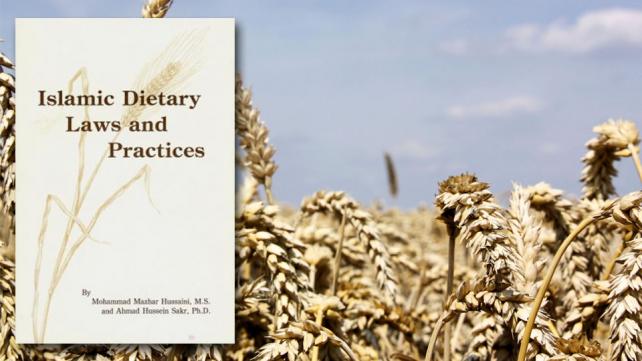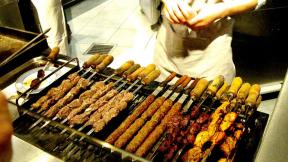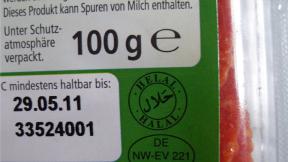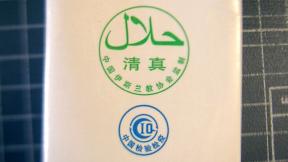
The lists of Halal and Haram food below have been taken with permission from the book 'Islamic Dietary Laws and Practices by Mohammad Mazhar Hussaini and M S Ahmad Hussein Sakr, Ph.D .
It should be noted that a product being imported from a Muslim country is not necessarily a guarantee that it is completely Halal. In fact, food is often imported from abroad into Muslim countries without proper checking of ingredients.
AN ALPHABETICAL DEFINITION GUIDE
An alphabetical list of Halal and Haram ingredients to look out for:
Bacon: A side of pig meat (pork).
Choletsorol: type of fat always of animal origin. If extracted from Zabiha animal, it is Halal.
Diglyceride: Emulsifier. If of animal origin it should be suspected till the source is known.
Gelatin (Jello Gelatin): Usually of animal origin, mostly from pig. If extracted from a dhabiha animal, then it is halal/
Glycerol (Glycerine): It could be of animal, plant or Glyceryl-Stearate synthetic origin. If animal source is used, it is suspected.
Hormones: Usually animal hormones are used for human consumption. One has to find out the source before passing a judgement.
Lard: Fat from swine particulaly found in the abdominal cavity. Totally Haram for us.
Magnesium Stearate (stearic acid): Used as an active ingredient in medicine tablets. Haram when derived from animal source.
Mono Glycerides: When derived from animal source. (Halal when the source is plant).
Pepsin: A digestive enzyme mostly from pig stomach.
Rennin (Rennet): A protein Enzyme. Usually not labeled. (In most cheeses).
Shortening: Fats and oils of animal origin. Animal/Lard
Vanilla: Extracted using alcohol.
Vitamins: Haram when from animal source. Mostly the source is synthetic or plant and are Halal.
Whey: Used in ice creams and yogurt. Haram when from animal source.
A PARTIAL LIST OF HALAL INGREDIENTS
S/N Name of Ingredients Code No Brief Description
Antioxidants: Chemical compounds used to protect certain food components from being destroyed or lost through oxidation.
Ascorbic acid: Vitamin C.
Benzoate (Benzoic acid): Benzoic acid and sodium benzoate are used for food preservation.
Biotin: A member of the B complex vitamins.
BHA: An antioxidant, preservative.
BHT: An antioxidant, preservative.
Citric acid: Sources are plant, usually of the citrus family. (e.g. orange, lime, lemon).
Cobalamine: Synthetically prepared Vitamin B12.
Dextrin: An emulsifying, sizing, and thickening agent.
Fiber: Sources are plant. Provide roughage to diet.
Fructose: Fruit sugar.
Gliadin (Gluten): Ptotein found in wheat and rye.
Hydrogenated oil: Vegetable oil being hydrogenated making it solid at room temperature.
Iodine: A nutrient for thyroid gland.
Lecithin: Emulsifier of fat. In the USA, sources are mainly soyabean and egg yolk.
Lipids : Essential fatty acids found in fish, plant and animals. If source is animal; it is suspected.
Malt: A kind of fermented grain.
Molasses: Syrup liquid obtained in refining sugar.
MSG: Flavoring. Imparts meat flavor to foods.
Niacin: One of the B complex vitamins.
PABA: A food supplement.
Pectin: A gelatinous substance extracted from fruits.
Propionic acid: A preservative.
Riboflavin: One of the B complex vitamins. Usually the source is synthetic.
Pure vegetable shortening: Source of this kind of shortening is plant.
100% vegetable shortening: Source of this kind of shortening is plant.
Sweetener: Substance that gives a sweet taste.
Thiamin: One of the B complex vitamins.
Vanillin: Flavoring agent, extracted from vanilla.
Vitamin A: If source are plant and synthetic, it is halal.
Vitamin C: Natural sources are from plant. (e.g. citrus fruit, tomatoes, etc).
Vitamin D: Natural sources are yeast and fish liver oil. Also synthetically produced.
Vitamin E: Rich sources of Vitamin E are vegetable oils. When source is synthetic, it is halal. If source is animal, it is suspected.
Water: The nutrient most vital to man's existence.
Food yeast: Microscopic, unicellular, fungal plant used for fermentation process and in baking bread.
Photo Attribution: "Weizen2" by Dako99 - Own work. Licensed under Creative Commons Attribution-Share Alike 3.0 via Wikimedia Commons - http://commons.wikimedia.org/wiki/File:Weizen2.jpg#mediaviewer/File:Weizen2.jpg








Comments
Thanks for the information. One more correction: Whey is ALWAYS "from animal origin" but is never from a pig - so should be considered halal. Whey is the liquid part of the milk that separates out from the curds when making cheese.
Location
Assalam o alykum wr wbktjazakullah khair for nice artical its really helpfull for all muslims who are living in nonislamic countries ...i have a question also me and my all family is using bread and now i checked in that bread a source has and its name is diglyceride (datem)and i dont know where from this item comes i meant its source plz can u explain me about this one send all information on my email ..jazakAllah khair may Allah bless uAllah hafizDua
Location
I have found this site very useful as you make your content easy to absorb. Thank you for having a site that provides info for convert muslims wanting to learn more about islam. May Allah bless you for your time and effort. Asalam walaikum
Location
you have a very good page here with a lot of easy to absorb explanations but with all due respect please note that what this page says about cholestrol is partially not true. i mean that nuts which do not origin from animals have cholestrol in them thus if a product like a chocolate with nuts mentions cholestrol, it might be due to nuts. also whole milk with all its purity has some amount of cholestrol in it.you have listed msg in halal ingredients, this is contrary to what i have heard. can you please confirm its status.wasalam,a concerned muslim
Location
Pages
Add new comment